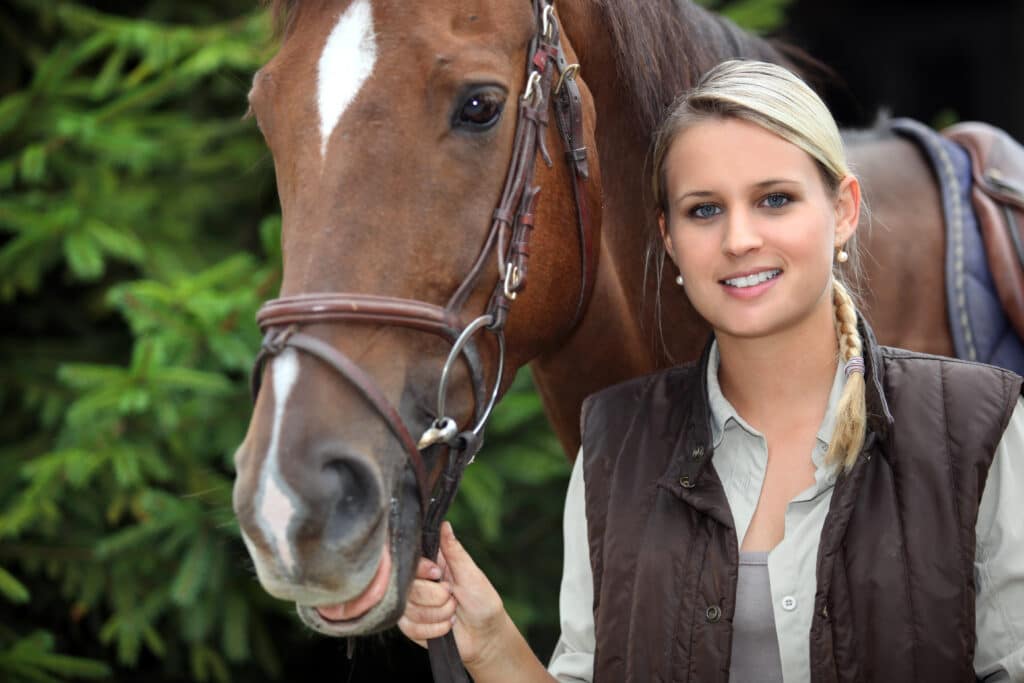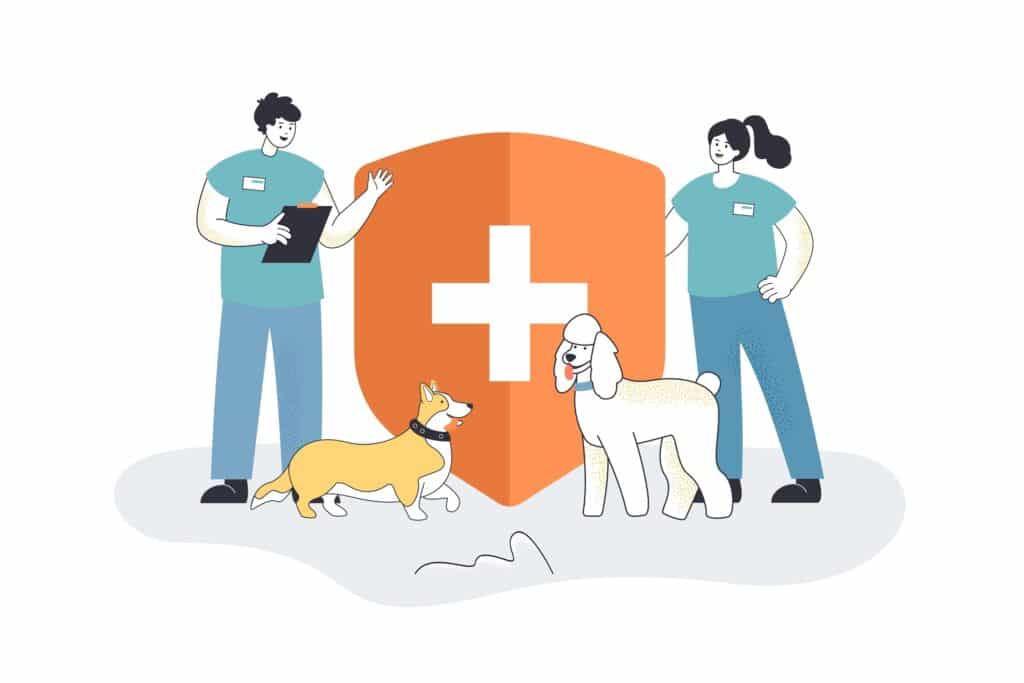The history of veterinary medicine dates back to 3000 B.C. Farmers in Mesopotamia used to perform healing practices on their sheep and work dogs to keep them in optimal health. However, it didn’t become a recognized career until 1761 when Claude Bourgelat founded the first school of veterinary medicine.
Over the centuries, veterinarians have come to be known as revered and respected members of society. Careers for veterinarians have diversified to include companion animals, livestock, and even wildlife.
This guide will go beyond the single-choice careers for veterinarians and dive into some more eclectic paths.
What Do Veterinarians Do?
A veterinarian is a doctor for animals. They have many responsibilities and often work with a diverse range of species. Their basic responsibilities often include diagnoses, treatment, administration of medication, and performing surgeries.
Although daily tasks may vary depending on specialization, all vets learn these basic skills during their education.
How to Become a Veterinarian
This first and easiest step to becoming a veterinarian is having a love for animals. The following steps require a bit more time, effort, and money.
1. Get a Bachelor’s Degree
Before you can get into the detailed study required to become a veterinarian, you must complete a bachelor’s degree in a related field. Most science-based fields will satisfy the academic requirements for getting into vet school. However, it is always good to double-check that you have satisfied all the requirements before applying.
2. Enroll In a DVM Program
A DVM or Doctor of Veterinary Medicine is the credential required to legally practice veterinary medicine. Similar to a human doctor, it requires four to five years of dedicated post-graduate study depending on the accredited university.
Core classes include anatomy, physiology, zoology, nutrition, biology, chemistry, and nutrition. In your final year, you participate in internships, volunteer programs, and hands-on clinical experience.
3. Take Credential Exams
After completing your DVM you will need to pass the NAVLE or North American Veterinary Medical Licensing Examination. This certifies you to legally practice in any of the fifty states. It’s important to note if you take the exam in a state different from where you intend to work you will need to have your scores transferred.
If you hope to practice internationally you might need to take additional exams. This will be dependent on the laws and regulations of your intended destination.
4. Specialized Study
Veterinarians also have the option of specializing in a particular area. After passing the NAVLE, you will be required to spend at least one year interning in your desired specialization. Then you will likely complete a residency program for two to three years.
Depending on the specialty additional education or exams are required. For example, to become a certified veterinary surgeon you will have to complete 80 hours of individual training with an anesthesiologist, pathologist, radiologist, and internal medicine specialist. This is in addition to your surgical study.

Careers for Veterinarians
When most people think of veterinarians they envision the private practice vet who takes care of their pets. However, careers for veterinarians cover a much wider range.
Small Animal Veterinarian
These types of veterinarians are the general practitioners of veterinary medicine. They are certified to treat a variety of companion animals brought in by appointment.
Although their schedules may include some variety, for the most part, they have a very structured work environment. Regular responsibilities include:
· Performing routine exams
· Vaccinations
· Drawing blood
· Prescribing medications
· Teeth cleanings
· Minor injury treatments
· Simple surgeries
More complex and difficult procedures are often performed by a veterinary specialist vs a general practitioner.
Large Animal Veterinarian
Another common career for veterinarians is working with livestock. This includes horses, sheep, goats, pigs, and cattle. Large animal vets often have to travel long distances to make house calls.
Along with routine health checks and injury treatment, a lot of their time is spent on breeding and reproduction. These tasks include:
· Ultrasounds
· Artificial inseminations
· Reproductive health assessments
· Birth assistance
· Pre-purchase exams for breeding stock This is a very demanding type of veterinary career that requires dedication and administrative organization. Vets work long hours, exert energy dealing with large animals, and are often called out at all hours of the night. It can also be quite messy, so if a clean and sterile office is important, this is not the veterinary career for you.

Equine Veterinarian
An equine veterinarian is a large animal vet who has chosen to specialize in horses. They work closely with both the animals and their owners to maximize health and treat illness and injury. Many equine vets deal exclusively with performance animals.
Like large animal vets, this career requires you to be on call for emergencies. There is also a high potential for long hours and drives.
Veterinary Surgeon
Beyond regular spay and neuter procedures, general practitioners perform very few surgeries. Some might have a few tricks up their sleeve due to specialized study or internship experience. For the most part, a veterinary surgeon is required for advanced procedures.
Being a veterinary surgeon requires intense focus, extensive knowledge, attention to detail, and a steady hand. It requires years of additional education, practice, and familiarity with animals.
Anesthesiology and Euthanasia
Even with basic procedures like teeth clean, it is often necessary to sedate animals to avoid additional stress and anxiety. Some of the responsibilities of an anesthesiologist include:
· Developing pain management plans
· Evaluating the patient
· Creating a sedation plan
· Monitoring vital signs
· Administering anesthesia and fluids
Another more unpleasant part of careers for veterinarians is euthanasia. It’s vital to be empathetic to the owners during this process. As the vet, you are responsible for making the experience as painless as possible for both the animal and its owner.
Critical Care Vet
If you are looking for one of the most fast-paced careers for veterinarians, then you might want to consider critical care. These specialized vets perform emergency and life-saving procedures. They often work long hours and emotionally taxing situations.
If you’re hoping to bond with the animals you’re working with, critical care isn’t the best choice. Animals that come to urgent care clinics are often under high levels of stress and anxiety. You must have a thorough understanding of safety practices and procedures to protect both yourself and the animal from harm.
Military
The Army Veterinary Corps is a great option for those with an urge to serve their country. It provides DVMs to expand their skill base through close work with military service animals, biomedical research, and animal handling practices.
Military veterinarians also have the opportunity to work with wildlife and endangered species. They can assist in disaster efforts, monitoring the health of search and rescue animals, and aiding those injured in the tragedy.
Animal Nutritionist
Like with humans, an animal’s diet affects its overall health and wellbeing. Animal nutritionists promote animal wellbeing through education and the study of nutrition. These types of veterinarians often work in the agricultural sector.
There is also the opportunity to set up your own company and work specifically with pets or zoo animals. As with any type of private practice setting up an online presence for your practice is essential for running your business and connecting with clients.

Zookeeper or Resident Veterinarian
You don’t need a Doctor of Veterinary Medicine degree to work at a zoo. However, it does come in handy. Positions as a zoo veterinarian are few and far between, so you might have to start as a keeper and work your way up.
As a zookeeper, you get to work directly with the animals. You’ll be able to take note of their behavior, eating habits, and idiosyncrasies. This information will prove invaluable when it comes to handling, diagnosing, and treating them.
Non-Profit Organizations and Causes
If you are looking to use your degree in veterinary medicine for the betterment of the world, you might consider doing some non-profit work.
Consider offering your private practice services pro bono to low-income families. Volunteer part-time at a no-kill animal shelter. Or, spend a year in South America working with a spay and neuter clinic.
Animal Causes
Another great career option for veterinarians is joining an animal cause that focuses on conservation or habitat restoration. One example of this is the African Wildlife Foundation. Responsibilities with this type of career often require more fieldwork than a traditional office role.
You will find yourself tracking, tagging, and monitoring the overall health of wild animals. You also might aid in breeding efforts, relocation procedures, and rehabilitation.
Education
Many veterinarians find enjoyment in teaching others. At times they do this in addition to their private practice. It is also quite common for veterinarians to retire or transition into an instructional role after years of practical employment.
Becoming a professor at an accredited university may require additional study to fully understand the responsibilities of being a teacher. Lesson planning, giving lectures, and grading papers are only some of the job requirements.
Veterinarians often indulge in research related to their area of instruction. For example, a veterinary professor teaching an equine anatomy class may have an active study involving leg length and lameness.

Research
There are lots of different careers for veterinarians when it comes to research.
Field veterinarians go out into nature to research animal behavior, population health, and genetic stability. This career involves travel and potentially harsh environmental conditions. You must also possess a keen affinity for detailed notes and record-keeping.
Laboratory veterinarians research everything from genetics to pathogens and behavior. They work in controlled environments and often perform repetitive procedures and experiments.
Media Content
Some careers for veterinarians take a more creative approach. As social media increases in popularity, some vets have taken to the screen to educate the public. Vets might enjoy splitting their time between content creation and medical practice.
Another avenue is working with a major TV corporation to educate the general public on animal welfare and veterinary practices. Dr. Pol and Dr. Oakley are two veterinarians who followed this type of career path.
Not interested in being onscreen at all? Veterinarians have been known to express their love for animals through art, photography, and videography. You might not need a DVM to take photos of your neighbor’s dog, but your understanding of animal behavior will come in handy when convincing him to sit.
Transferable Skills
People leave their careers in veterinary medicine for any number of reasons. Some reach ripe retirement ages, others get burnt out, and a fair few realize their calling is elsewhere. Whatever the reason, should you ever decide to transition into a different field, you will be armed with countless transferable skills.
Empathy: Being a veterinarian isn’t just about working with animals. You learn to develop empathy and human connection when interacting with owners and coworkers. This is such an invaluable skill that many companies offer courses in workplace empathy and emotional intelligence.
Stress Management: Animals are often unpredictable, especially when scared or injured. Initially, this can be quite stressful, but over time you will learn how to curb your stress and fear responses. After a horse almost bucks your head off you won’t even bat an eyelash when it comes to other work stressors.
Organization: Running your own practice requires intense organizational skills. You must develop a system to manage clients, billing, appointments, and patient history. These organizational skills apply to almost every other career opportunity you may encounter.
Critical Thinking Skills: Since animals can’t tell us what’s wrong, as a veterinarian you must use critical thinking skills when diagnosing and treating your patients. By working with a range of different species you’ll often be forced to think outside the box to come up with novel solutions.

Life as a Veterinarian
Getting a degree in veterinary medicine opens countless doors. Careers for veterinarians range from domestic pets to wildlife and laboratory research. With such a diverse array of opportunities, there is plenty of room for growth, change, and personal preferences. If you are considering setting up your own veterinary practice, we encourage you to contact us about Daysmart Vet Software. Our system lets you manage everything in one place, from appointments to records and billing. Find out more today!

